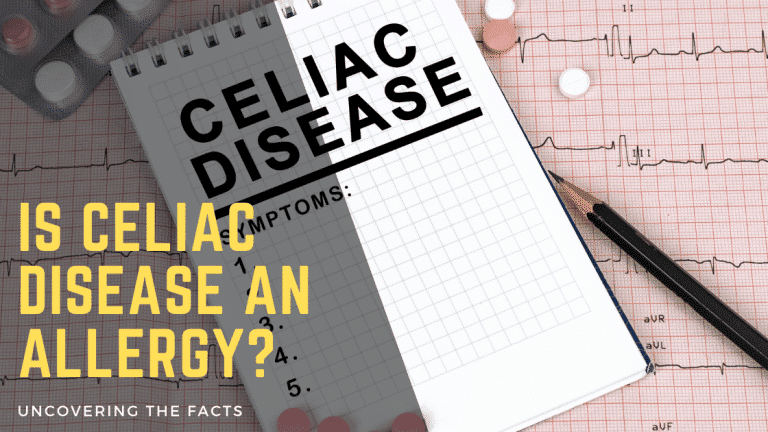Can You Outgrow Celiac Disease? – A Common Myth Busted

Picture this: you’ve just been diagnosed with celiac disease, and you’re feeling a bit bewildered.
Will you have to follow a strict gluten-free diet for the rest of your life? Is there a chance you might outgrow this condition, like some allergies?
I know I had these questions when I first received my diagnosis.
So let’s dive right into it – can you outgrow celiac disease?
The short answer is no you can’t – celiac disease is a lifelong condition that can only be treated with a strict gluten-free diet.
Read on to find out why and learn more about why you’re in it for the long haul when it comes to celiac disease.
The Inescapable Truth: Celiac Disease Is Here to Stay
Celiac disease is an autoimmune disorder affecting the small intestine, causing damage when gluten is ingested.
Unlike allergies, which some lucky individuals may eventually outgrow, celiac disease is a lifelong condition that requires a strict gluten-free diet for proper management.
The Importance of Accurate Diagnosis
It’s crucial to receive an accurate diagnosis of celiac disease, as the implications of living a gluten-free life are significant.
Misdiagnoses can lead to unnecessary dietary restrictions, which can cause other health issues.
The diagnostic process usually starts with blood tests and may include an intestinal biopsy to confirm the presence of damaged villi.
If you suspect you have celiac disease or are experiencing symptoms of celiac disease, it’s essential to consult with a medical professional for proper testing and diagnosis.
Life as a Celiac: A Commitment for the Long Haul
Once diagnosed, adhering to a strict gluten free diet is the only effective treatment for celiac disease. This means avoiding foods containing gluten, including wheat, barley, and rye.
While this may sound daunting, there are many resources available to help you navigate this new lifestyle, such as my guide on how to know if something is gluten-free.
Beyond the Diet: Dealing with Symptoms and Complications
While following a gluten-free diet is essential, it’s also important to understand and manage the various symptoms and complications that can arise from celiac disease.
Some common symptoms celiacs experience include abdominal pain, diarrhea, constipation, and joint pain.
In addition to these symptoms, celiac disease can cause damage to other organs and lead to complications such as anemia, osteoporosis, and even certain types of cancer [1].
Regular check-ups with your doctor and appropriate medical tests can help monitor and address these complications.
The Emotional Rollercoaster: Coping with a Celiac Disease
Being diagnosed as a celiac can be an emotional experience, as it requires a significant lifestyle change.
It’s essential to find support, whether from friends, family, or online communities, to help you navigate this journey.
Sharing experiences and tips can make the transition to a gluten-free life more manageable, as well as help alleviate feelings of isolation.
Living a Full Life with Celiac Disease
Despite the challenges of living with celiac disease, it’s crucial to remember that you can still lead a happy and fulfilling life.
There are numerous resources available to help you avoid foods that contain gluten and live as normal of a life as possible well into your adult years.
Moreover, the increasing availability of gluten-free products and the growing awareness of celiac disease have made dining out and socializing easier for those with the condition.
By learning what happens when a celiac eats gluten and understanding your limitations, you can still enjoy a wide variety of foods and experiences.
Final Thoughts: Embracing the Gluten-Free Journey
To sum up, you cannot grow out of celiac disease, and once diagnosed, it requires a lifelong commitment to a gluten-free diet.
Accurate diagnosing is essential to ensure you’re taking the necessary steps for your health.
People with celiac disease can find life a challenge, but with the right resources, support, and mindset, it’s possible to thrive and enjoy a fulfilling life.
So even if your doctors diagnose celiac disease, don’t let it hold you back; embrace the journey and discover the keys to unlocking a happy, healthy, gluten-free life.
If you’re looking for more information or support on your gluten-free journey, I’d recommend checking out some of my other helpful articles:
- Does Gluten Cause Constipation?
- Can IBS Become Worse?
- Does IBS Come and Go?
- Gaining Weight with Celiac Disease
Disclaimer: This content is based on my personal experience as an individual diagnosed with celiac disease and IBS (Irritable Bowel Syndrome) who follows a strict gluten-free diet. This does not constitute medical advice. Please consult a medical professional, nutritionist, or qualified dietitian for personalized, professional advice.





